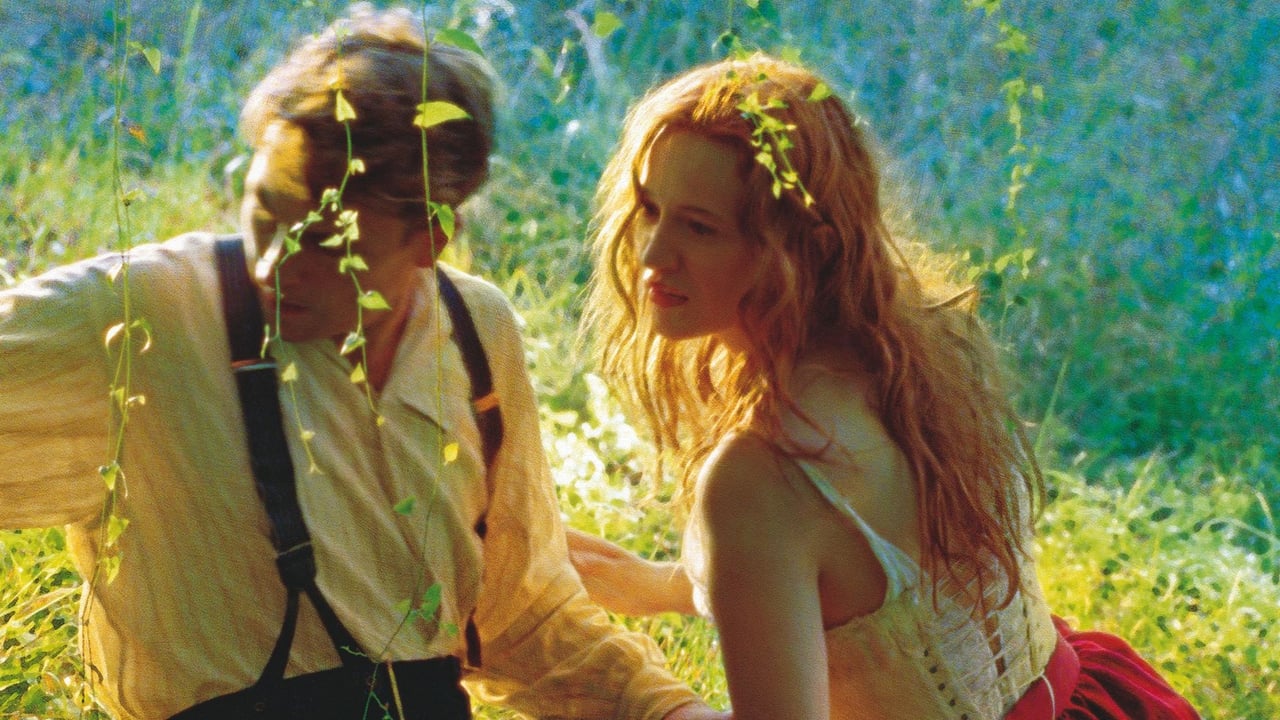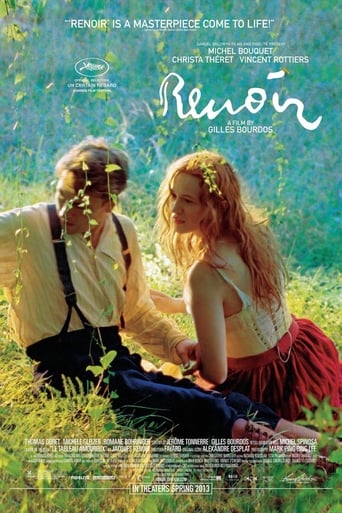

Sure, the film uses wonderful natural imagery of the French Rivera. Yes, the setting is absolutely beautiful and every tiny detail of the historical setting is well accounted for. Definitely, the score adds well into the film's romantically artistic theme. And still there's the fantastic acting and directing to appreciate. Yet there's a but. The film is so boring that the average viewer will never be patient enough to watch the film till the credits roll, the ending is highly unsatisfying and almost abrupt, and the ultimate point of the film is really unclear and clouded over puzzling and not very meaningful phrases that appear to make the film have a message that it failed to deliver. Was the film discrediting ideals of patriotism over art and individualism or not? Was the film ridiculing so-called 'progressive' and 'open-minded' artists or not? And if one knows the true story behind it, this film really has a bleakness attached to it, and you feel a lot of pity for the lead female character.Not one of the greatest Oscar submissions from France, but hey, the setting could make a lot of tourists go southwards from Paris.
... View MoreWriter/director Gilles Bourdos (with assistance from Jacques Renoir, Michel Spinosa, and Jérôme Tonnerre) bring us the incandescent beauty of a transcendent summer in 1915 in the Côte d'Azur when Pierre-Auguste Renoir began the denouement of the Impressionist period of painting. More than a simple story, this film is a recreation of the view of nature and of the human figure as bathed in that special light of the countryside of France. It is as much an artwork as t is a biographical view of one of history's great painters.The Côte d'Azur, 1915. In his twilight years, Pierre-Auguste Renoir (Michel Bouquet) is tormented by the loss of his wife, the pains of rheumatoid arthritis severely limiting his movement, wheelchair-bound, and the agony of hearing that his son Jean (Vincent Rottiers) has been wounded in the action of WW I. His household is tended by maids who have been previous models, and his youngest son Coco (Thomas Doret) who suffers from the lack of attention from his still grieving father. But when a young girl miraculously enters his world, the old painter is filled with a new, wholly unexpected energy. Blazing with life, radiantly beautiful, Andrée Heuschling (Christa Theret) will become his last model, who rejuvenates, enchants, and inspires both father and son. Returning to the family home to convalesce, Jean too falls under the spell of the new, redheaded star in the Renoir firmament. In their Mediterranean Eden - and in the face of his father's fierce opposition - he falls in love with this wild, untamable spirit... and as he does so, within weak-willed, battle-shaken Jean, a filmmaker begins to grow.Bathed in the cinematography glow of Ping Bin Lee and the subtle, sensual musical score by Alexandre Desplat and greatly enhanced by a pitch perfect cast, this film is more of a mood piece than a biopic. At film's end we are informed of the lives of the characters; Jean married Andrée and they made very successful films together until their divorce (Jean Renoir become one of the most highly regarded film directors in history, dying in 1979 – the year that the then destitute Andrée died, Coco (Claude) Renoir gained fame as a ceramic artist, and the eldest on Pierre became an actor whose son became the brilliant film maker Claude Renoir). It is an important moment in the history of art and a quietly pensive study of the mind of artists and their models. Highly recommended. Grady Harp, December 13
... View More'Renoir' is the new French biopic about the last years of the great painter, Pierre-Auguste Renoir. If you think about it, creating a film biography of any painter is difficult because the act of creating a painting, does not lend itself to great drama. The painter's life has to be dramatic. What makes 'Renoir' doubly difficult is that director Gilles Bourdos has chosen to view Renoir at the point in his declining days. 'Renoir' is sort of like an extremely impressive family video postcard. This is what it has going for it: Fantastic visuals (Bourdos employed the infamous art forger, Guy Ribes, to reproduce the Renoir paintings throughout the film), a haunting musical score and the marvelous Michel Bouquet, in a compelling character study of the brilliant but often petulant artistic genius, Renoir. My favorite line of Renoir's is when he speaks of the flesh as "everything". Despite suffering from crippling rheumatoid arthritis, Renoir managed to keep producing great paintings, up until the end.What 'Renoir' unfortunately does not have much of, is drama. The story focuses on the appearance of Andree Hesuchling, an aspiring actress who ends up as Renoir's last model for his masterpieces. After Jean Renoir returns from World War I, convalescing from a leg wound, there is some tension between father and son, after Jean takes an interest in Andree (it was Renior himself who had the reputation of bedding his models while he was married and before his illness made him dependent on others).There is also a focus on Jean's internal arc, as he struggles to find his own inner voice. We become privy to Jean's future greatness, when he shows a short silent film, to his admiring family (including his father). The second act crisis fails to excite, when Andree suddenly disappears from the household, causing Renoir to become quite upset. Jean finds her at a bordello of sorts but convinces her to return to the Renoir estate. We later learn in the credits that she starred in Jean's early films, up until 1931, when they separated. Tragically, Andree fell into poverty and obscurity. Jean, on the other hand, remains a legend in cinematic history.'Renoir' has excellent performances from all the supporting players including Thomas Doret as Coco, Renoir's youngest son, who aches to fly free from teenage bondage.I couldn't get very excited about 'Renoir' despite the fact that visually it certainly is a beautiful film. Would I advise you to go and see it? Yes. But don't expect any great revelations. You can usually learn quite a bit from wise old men as they talk about the past—but an examination of their present circumstances, doesn't always lead to compelling narrative.
... View More+Renoir (France, 2012, 112 min)Gille +Bourdos uses the well-known stories of the painter father Pierre-Auguste and the filmmaker son Jean Renoir for a film that is at once breathtaking spectacle and a profound anatomy of the impulses and values of art. The film was one of my highlights at this year's +Palm Springs International Film Festival.The plot presents the 74-year-old veteran painter (Michel Bouquet) and his ravishing new 15-year-old model, Andree Heuschling (Christa Theret) enjoying their opulent country estate while WW I pounds the humanity outside. Mark Lee Ping-Bin shoots the interiors with classic Dutch light and shadow but the exteriors in the unbridled luminosity of Impressionism. Here Renoir explains that structure comes from colour, not form, and he refuses to use black. That summarizes the painter's Impressionism: it finds reality in what he makes of the outside world, not what it firmly may be. His swirls of rosy chub continues his celebration of the young "velvet" flesh, despite the war's flensing and destruction of the flesh beyond the estate and his age's grotesque gnarl and ruin of his bones. His painting days, like his valiant denial of death, are limited.Son Jean (Vincent Rottiers) returns from the front with a symbol of the reality his father rejects: an open wound. The family has a variety of open wounds, from the loss of the boys' mother and the favoured model/nanny Gabrielle to the sons' resentment of their father's aloofness. The cut to the bone represents the reality Renoir's fleshy ladies and painted pommes reject. Vincent's convalescence goes beyond the flesh gap to include winning Andree, who -- a closing title tells us -- married him, starred in many films (as Catherine Hessling), and after their split died alone in poverty. The sins of the father don't just visit the son but move in with him.The tension between the painter's idealized flesh and the its horrific reality are frequently imaged, especially in the eating scenes and in the kitchen where a maid delicately peels a tomato, removing a hide to expose a succulent flesh. The hanging carrion are an implicit reminder of the hunting and killing of the human prey outside. Renoir pere screams from the nightmares he doesn't have his sunshine, models and pink paints to ward off. Around the story of Renoir pere beats a more subtle story of Renoir fils. Like Andree, the film serves both father and son. Unobtrusively Bourdos weaves in the specific sources of Renoir's cinema. These include his sense that wars shatter natural cross-border fraternities, the harshness of the class prejudices, the increasing disrespect for culture, the necessity for art. Even the quintessential understanding which will become "The terrible thing is, everyone has his reasons." For more see www.yacowar.blogspot.
... View More